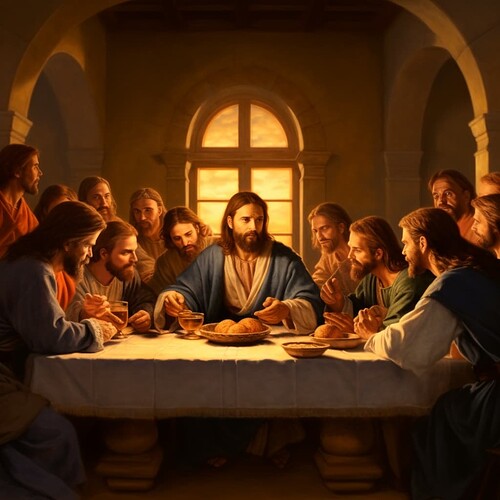 January 24: Matthew 26: The Passion Begins
January 24: Matthew 26: The Passion Begins
Witnessing Jesus’ Final Hours and His Unwavering Mission
 Introduction
Introduction
Today, we immerse ourselves in Matthew 26, a chapter that marks the beginning of Jesus’ passion. This chapter narrates the events leading to Jesus’ crucifixion, highlighting His betrayal, Last Supper, and arrest.
 Matthew 26: A Prelude to the Cross
Matthew 26: A Prelude to the Cross
Matthew 26 opens with Jesus predicting His crucifixion, followed by the anointing at Bethany, the Last Supper, His agony in Gethsemane, betrayal by Judas, and His arrest. This chapter sets the stage for the fulfillment of Jesus’ mission.
Key Verse: “This is my blood of the covenant, which is poured out for many for the forgiveness of sins.” — Matthew 26:28
 Key Themes and Reflections:
Key Themes and Reflections:
The Last Supper: A pivotal moment where Jesus institutes the Lord’s Supper, symbolizing the new covenant through His blood.
Betrayal and Arrest: The chapter presents the stark contrast between Judas’ betrayal and Jesus’ steadfast commitment to God’s plan.
Gethsemane’s Agony: A profound depiction of Jesus’ humanity and divinity, as He submits to the Father’s will amidst deep anguish.
 Today’s Application:
Today’s Application:
Reflect on the depth of Jesus’ sacrifice and His unwavering commitment to God’s redemptive plan. Consider how His teachings at the Last Supper apply to our lives as a call for continual remembrance and commitment.
 Hidden Gem:
Hidden Gem:
Did you know? The anointing at Bethany, where a woman anoints Jesus with expensive perfume, prefigures His burial, symbolizing honor and acknowledgment of His impending death.
 Reflective Q&A:
Reflective Q&A:
![]() Matthew 26: The Passion Begins
Matthew 26: The Passion Begins
![]() Significance of the Last Supper: How does the Last Supper deepen our understanding of Jesus’ sacrifice?
Significance of the Last Supper: How does the Last Supper deepen our understanding of Jesus’ sacrifice?
A: The Last Supper illustrates Jesus’ sacrifice as the Lamb of God, who takes away the sins of the world. It serves as a continual reminder of His enduring presence and the new covenant of grace.
![]() Responding to Betrayal: What can we learn from Jesus’ response to Judas’ betrayal?
Responding to Betrayal: What can we learn from Jesus’ response to Judas’ betrayal?
A: Jesus’ response to Judas’ betrayal demonstrates grace and sovereign knowledge. It teaches us to respond to betrayal with forgiveness, understanding the bigger picture of God’s plan.
 Join the Discussion:
Join the Discussion:
How does Matthew 26 impact your perception of Jesus’ journey to the cross and His teachings? Share how this chapter influences your spiritual walk and understanding of Christ’s sacrifice.
#Matthew26 #PassionOfChrist #LastSupper #Faith #Redemption #BibleStudy #SpiritualJourney
![]() See You Tomorrow in Matthew: Continue exploring the profound moments of Jesus’ passion as we delve further into His journey to the cross.
See You Tomorrow in Matthew: Continue exploring the profound moments of Jesus’ passion as we delve further into His journey to the cross.
 Join the Forum!
Join the Forum!
Engage in our AIgniteScripture Community for deeper exploration and connection:
Free Members: Participate in discussions and access valuable resources. Join here: https://forum.aignitescripture.com/join
Supporters Membership ($20/month or $200/year): Gain access to exclusive content, newsletters, and forum discussions to enrich your biblical understanding.
